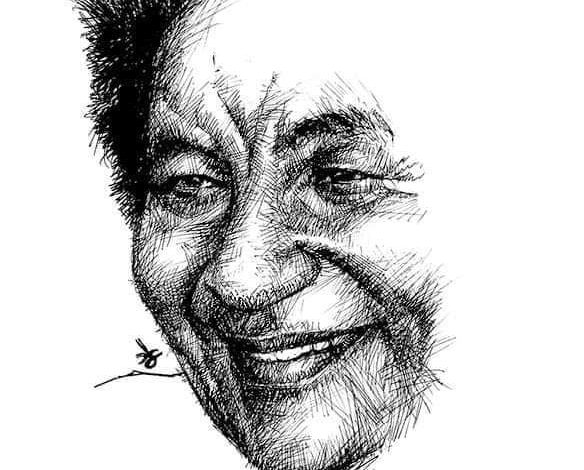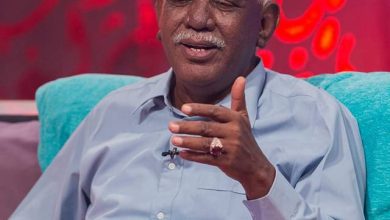Standing on the river bank, between Wardi and Wardi: (On the occasion of the 12th anniversary of the passing of Africa’s first artist)

By: Abdul Latif Mojtaba
Wardi sang “I Miss You So Much, I swear” by its poet Mahjoub Sharif, with its melody that fell into people’s hearts, followed by (Yalla Wa Ta’al Yalla), that famous song by Ishaq Al-Halnaqi.
This experience raised many questions in my mind, the most important of which are:
Why did the artist Wardi do that when he is known as a waterfall of melodies flowing with constant sweetness non-stopped?
What message did he want to send?
Did Wardi side with his artistic project instead of the political one when he changed the words of the melody of the anthem or the song “I Miss You So Much, I swear to God” and its text was loaded with a clearly defined, red-coloured political speech, which was a headline at the outbreak of the May Revolution, replacing them with different symbolic words, which were “Come and come, let’s immigrate to God’s country.”
Before answering these questions, we must emphasize that Wardi, in his long experience, was artistically intelligent, and he had positions in this matter that his contemporaries attest to. This indicates that he thought that he had to re-record the melody in new words to declare that he had gotten rid of the consequences of blatant politics, its weight, responsibilities, obligations, and limitations, declaring his freedom from the ideology that considers art a means and not an end in itself, and confirming that the artist loves freedom and emancipation. He did not say this explicitly, but when he sang Al-Halnaqi’s words to the same melody for the first time, he said that he requested a new text that would reduce the harshness of the text opposing the regime. Perhaps it was out of concern for his artistic project and that the continuity of aesthetic giving was better for him than the conflict of politicians, so he would leave political work to his family and commit to his artistic project, which had become an edifice. This, in my opinion, is the essence of the answer to the previous question. Perhaps the call to emigrate to God’s vast earth is an indication of the necessity of emancipation. At the same time, he does not lose a beautiful melody that later found a big leap.
Hence, the audience noticed that Wardi’s artistic project, throughout its period of nearly sixty years, has been aware of such traps. His artistic career recorded transitions at the level of art itself, through his works that followed his imprisonment in the early seventies by the “Mayo regime,” we find that he came up with an experience with different features that appeared in his new works in form and content, announcing the end of the period of that long-term dualism between him and the poet Ismail Hassan, Mahjoub Sharif came with his immortal words, “Without a Date”, “Leave” by Al-Tijani Saeed, “I Call Her” by the poet Al-Dush, as well as “Al-Wad,” which represents one of the pearls of his artistic experience aesthetically, so it was a season new to the map of Sudanese, Arab and African art in general.
Likewise, by entering this new phase, he not only left a phase with political features, but also left an entire artistic phase that remained in his experience for a long period of time, despite those immortal works with prominent artistic and objective features, to which works such as “Lou Bhamsa,” “Asfay,” “Al-Raila,” and other poems by Ismail Hassan sung by Africa’s first artist. However, he did not support it and fled again to those young, fresh worlds emanating from the voice of a girl forgotten in the middle of the sessions. I do not think that all this new momentum came unexpectedly.
Promises to begin: It can be said that such artistic processes are considered profound lessons for generations and that they say that art and the artist do not have to be biased towards one group over another as long as his message is comprehensive and sincere. Replacing the text of the song (I miss you so much, I swear to God) by the people’s poet with the words (Come on, let’s emigrate to God’s country) by the President of the Republic of Love was a blatant declaration that he is an artist and not a politician, that he is a renewed artist and that art is an eternal message, the immortality of beauty in people. In the midst of this beauty, he did not forget his national project, in which he represented the voice of the people in their stances against the regimes, through which he presented immortal works such as “The Octobriats” and “The Wedding of Sudan” by the poet Al-Fitouri, “The Eyes Stare at You, O Homeland” by Lud Al-Makki, and “We Meet You Today, My Homeland.” By Mubarak Bashir, and “Our Homeland, Your Name is Our Book, Our Place” by Mahjoub Sharif and other immortal patriotic works that spread the spirit of love for the country, stoked the spirit of patriotism, and enhanced the values and deeds that characterize the people of Sudan. These patriotic works are undoubtedly no different from his creative and aesthetic project in his career Long technical.



